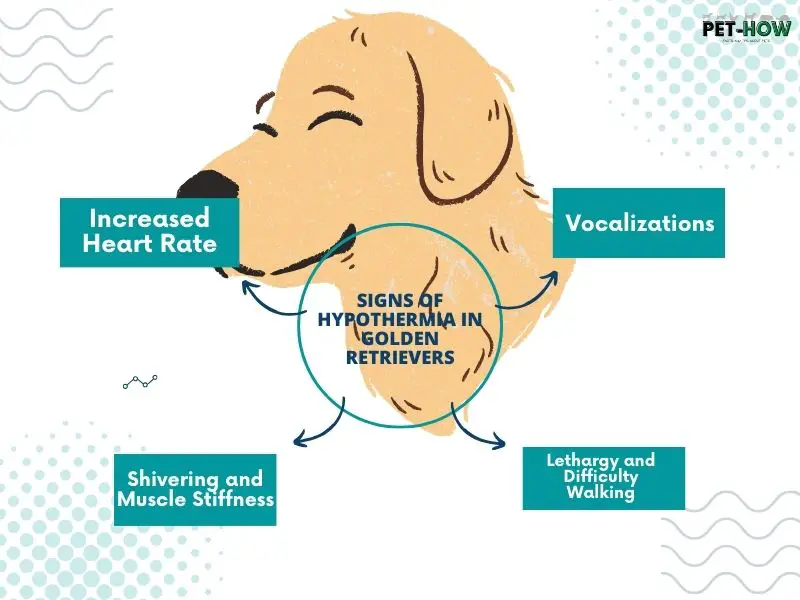Ever wondered how your furry friend feels in the biting cold? While Golden Retrievers are known for their thick coats, how cold is too cold for them?
Golden Retrievers are a popular breed of dogs known for their friendly and outgoing nature. They have a thick, water-repellent double coat that keeps them warm in cold weather.
However, like all dogs, golden retrievers can also feel the effects of extreme temperatures.
As pet owners, it’s important to know how to keep our furry friends safe and comfortable in all types of weather.
This is especially true for golden retrievers, as they are known for their love of the great outdoors.
- Key Takeaway
- How Cold is Too Cold for Golden Retrievers?
- How Long Can Golden Retrievers Play Outside In The Cold
- Golden Retriever Traits and Cold Tolerance
- Risks of Cold Weather For Golden Retrievers
- Signs of Hypothermia In Golden Retrievers
- Signs That Your Golden Retriever is Too Cold
- How Can I Keep My Golden Retriever Warm in Cold Weather?
- Do Golden Retrievers Need Snow Boots?
- FAQs
- Q: Can golden retrievers get hypothermia?
- Q: How can I prevent my golden retriever from getting too cold?
- Q: Do golden retrievers have a higher tolerance for cold weather?
- Q: Can I let my golden retriever play outside in cold weather?
- Q: What are some cold weather tips for golden retrievers?
- Q: Can golden retrievers handle colder temperatures than other dog breeds?
- Q: Is it safe to leave my golden retriever outside in freezing temperatures?
- Conclusion and final thoughts
Key Takeaway
- Golden Retrievers start to feel uncomfortable in temperatures below 20°F (-6.7°C), and it becomes too cold for them at around 14°F (-10°C), requiring limits on outdoor activities and time spent outside.
- Healthy adult Golden Retrievers can engage in outdoor activities for 30 to 60 minutes when temperatures are between 14 to 32°F (0 to -10°C), after which they may start showing signs of discomfort.
- Golden Retrievers, known for their friendly and tolerant attitudes, have medium-density double coats that provide them with good resistance to cold weather, but they are not built for extremely low temperatures or prolonged periods in the cold.
- Exposure to cold weather for extended periods can lead to hypothermia, frostbite, dry and cracked paws, and respiratory complications in Golden Retrievers.
- Signs of hypothermia in Golden Retrievers can include increased heart rate followed by a slow heart rate, rapid breathing, shivering, muscle stiffness, lethargy, difficulty walking, pale gums, cool body surfaces, confusion, and in severe cases, they may become unresponsive or cease shivering completely.
How Cold is Too Cold for Golden Retrievers?

The temperature below 20°F (-6.7°C) is too cold for Golden Retrievers, but this can vary depending on the individual dog’s health status and age.
Golden Retrievers, with their thick double coats, are known to tolerate cold weather fairly well. However, like any breed, they have their limits.
Prolonged exposure to temperatures below 20°F (-6.7°C) can lead to hypothermia and frostbite, especially in puppies, senior dogs, or those with health conditions.
It’s also important to consider other factors such as wind chill and humidity. A harsh wind or high humidity at lower temperatures can make it feel much colder than it actually is, potentially putting your Golden Retriever at risk even above the 20°F (-6.7°C) mark.
In my experience as a veterinarian, I’ve found that each dog has its own tolerance to cold. Factors such as the dog’s age, health condition, weight, and coat condition can all influence this.
For example, a healthy adult Golden Retriever with a well-groomed coat may have no problem frolicking in the snow for an hour, while a puppy, an older dog, or a dog with a health condition might begin to show signs of discomfort after just a few minutes.
Therefore, it’s crucial to monitor your Golden Retriever closely during cold weather. Look out for signs of discomfort such as shivering, whining, anxiety, and slowing down or becoming lethargic. If you notice any of these signs, it’s time to bring your dog inside to warm up.
How Long Can Golden Retrievers Play Outside In The Cold

Golden Retrievers can typically play outside in the cold for around 30 to 60 minutes, depending on the temperature and their overall health.
Golden Retrievers are a breed well-equipped to handle colder weather, thanks to their thick, water-repellent double coats.
These coats provide excellent insulation against the cold, allowing them to enjoy outdoor activities even when temperatures drop. However, the amount of time they can comfortably spend outside varies based on the specific temperature, their age, health status, and individual tolerance to cold.
In temperatures between 14°F and 32°F (-10°C to 0°C), healthy adult Golden Retrievers can engage in outdoor activities for approximately 30 to 60 minutes. This timeframe can be shorter for puppies, senior dogs, or those with health conditions, as they may not tolerate the cold as well.
When playing in the snow, it’s recommended to limit sessions to about 30 minutes at a time to prevent the dog from getting too cold. Even with their protective coats, prolonged exposure to freezing temperatures can lead to risks such as frostbite and hypothermia.
It’s also crucial to consider other weather conditions. If it’s rainy, windy, or snowy, even temperatures around freezing can be too harsh for extended periods outside.
In my experience as a veterinarian, I’ve seen that each Golden Retriever has its own unique tolerance to the cold.
Therefore, monitoring your dog’s behavior during outdoor play is essential. Signs of discomfort can include shivering, whining, anxiety, and lethargy. If you notice any of these signs, it’s time to bring your Golden Retriever inside to warm up.
Golden Retriever Traits and Cold Tolerance

Golden Retrievers, characterized by their friendly disposition and thick double coat, generally have a high tolerance for cold weather, but individual factors can affect this tolerance.
The Golden Retrievers are a breed known for their adaptability, intelligence, and especially their friendly nature.
These traits, along with their thick, water-repellent double coat, make them well-suited to a variety of climates, including colder temperatures. The double coat serves as natural insulation, with the outer layer repelling water and the undercoat providing warmth.
However, while their physical attributes offer some protection against the cold, Golden Retrievers, like all dogs, have limits to how much cold they can comfortably endure.
Their tolerance can vary based on numerous factors, such as age, overall health, and individual disposition. For example, older dogs, puppies, or those with health conditions may not tolerate colds as well as a healthy adult would.
Risks of Cold Weather For Golden Retrievers
While Golden Retrievers are generally well-equipped for cold weather due to their thick double coat, they still face risks such as hypothermia and frostbite from prolonged exposure to freezing temperatures.
Hypothermia
Hypothermia is a significant risk for Golden Retrievers exposed to cold temperatures for extended periods. It happens when the dog’s body temperature drops below normal, leading to a slowed heart rate, respiratory problems, and, in severe cases, loss of consciousness.
Signs of hypothermia include intense shivering, lethargy, and frostbite on the ears, tail, or paws. If your Golden Retriever shows these signs, it’s crucial to bring them indoors and seek immediate veterinary care.
Frostbite
Frostbite is another risk for Golden Retrievers in cold weather. This condition occurs when the dog’s skin and tissues freeze due to exposure to cold temperatures. The areas most susceptible to frostbite are the paws, ears, and tail.
Signs of frostbite include discoloration of the skin, coldness to the touch, and pain when touched. If you suspect your Golden Retriever has frostbite, warm the affected areas slowly with lukewarm water and contact your vet as soon as possible.
Aggravation of Pre-existing Health Conditions
Cold weather can also exacerbate certain pre-existing health conditions in Golden Retrievers. For instance, dogs with arthritis may experience increased stiffness and discomfort in the cold.
Similarly, dogs with heart disease may struggle more in colder weather due to the extra strain on their cardiovascular system.
Signs of Hypothermia In Golden Retrievers

Golden Retrievers, like other dogs, may display signs such as increased heart rate, shivering, and lethargy when experiencing hypothermia, a condition that occurs when their body temperature drops significantly.
Increased Heart Rate
One of the initial signs of hypothermia in Golden Retrievers is an increased heart rate. This is the body’s attempt to generate heat and raise the body temperature. However, as hypothermia progresses, the heart rate may slow down significantly.
Shivering and Muscle Stiffness
Shivering is a natural response to cold and one of the earliest signs of hypothermia. The rapid muscle movement associated with shivering generates heat and helps warm the body. However, if the cold exposure continues, the shivering may be followed by muscle stiffness.
Lethargy and Difficulty Walking
Lethargy is another common sign of hypothermia. A Golden Retriever suffering from hypothermia may seem unusually tired, unresponsive, and may have difficulty walking. This happens because low body temperature affects the normal functioning of the muscles and nervous system.
Vocalizations
Golden Retrievers may also exhibit vocalizations such as whining or barking when they’re feeling distressed due to hypothermia. This is their way of communicating discomfort or pain.
Signs That Your Golden Retriever is Too Cold
Golden Retrievers may exhibit signs such as shivering, reluctance to move, and changes in behavior when they are too cold.
Shivering or Shaking
One of the most apparent signs that your Golden Retriever is too cold is shivering or shaking. This is the body’s automatic response to generate heat when it senses cold.
If you notice your Golden Retriever shivering, it’s time to get them out of the cold and into a warmer environment.
Reluctance to Move or Walk
If your Golden Retriever is too cold, they may become reluctant to move or walk. Dogs do this to conserve heat and energy. They might also lift their paws off the ground more often than usual to limit contact with cold surfaces.
Changes in Behavior
Changes in behavior can also indicate that your Golden Retriever is feeling too cold. For instance, they may seek shelter or places that provide warmth.
Excessive whining, barking, or displaying a hunched posture with a tucked tail can also be signs of discomfort due to cold temperatures.
Limping
In some cases, if the ground is too cold, your Golden Retriever might start limping. This is because the cold surface can cause discomfort or even pain in their paws.
From my veterinary standpoint, I’ve seen many cases where these signs were clear indicators that a dog was too cold.
It’s critical to pay close attention to your Golden Retriever’s behavior during cold weather and take immediate action if you observe any of these symptoms.
Providing them with a warm shelter and limiting their exposure to extreme cold can help ensure their comfort and well-being says AKC.
How Can I Keep My Golden Retriever Warm in Cold Weather?
To keep your Golden Retriever warm in cold weather, consider providing a cozy sleeping area, dressing them in a dog jacket or sweater, and ensuring they have adequate shelter when outside.
Provide a Warm, Cozy Place to Sleep
Golden Retrievers need a warm and comfortable place to rest during the cold months. This could be a bed with insulating material on the inner walls, or even using cedar chips as bedding, as wood is a great insulator that stores heat.
Dress Your Dog in a Jacket or Sweater
While Golden Retrievers have a thick double coat that provides some warmth, when temperatures drop severely, a dog jacket or sweater can provide additional protection from the cold. Just make sure it’s completely dry before they go outside, especially if they’ve just had a bath.
Ensure Adequate Shelter
If your Golden Retriever spends a significant amount of time outdoors, ensure they have adequate shelter to protect them from wind, snow, or rain. The shelter should also have sufficient insulation to retain heat.
Protect Paws from Cold Surfaces
Consider getting booties for your Golden Retriever to protect their paws from cold surfaces, especially when walking on snow or icy sidewalks. After a walk, always clean their paws to remove any sand, grit, or de-icing chemicals that can cause irritation.
Feed Extra Food
In cold weather, dogs burn more calories to stay warm. Feeding your Golden Retriever a little extra can give them the necessary energy to maintain their body temperature.
As a veterinarian, I’ve guided many pet owners on how to keep their dogs warm and safe during the winter months.
Remember, each dog is unique and may react differently to cold weather. Therefore, it’s essential to observe your Golden Retriever’s behavior and comfort level in cold weather and adjust their care accordingly says Wikipedia.
Do Golden Retrievers Need Snow Boots?
Golden Retrievers can benefit from wearing snow boots as they provide protection from cold, icy surfaces and harmful substances such as de-icing salts and chemicals that are often used in winter.
Snow boots are not just a fashion statement for dogs – they serve a practical purpose. They protect your Golden Retriever’s paws from the harsh winter elements. Cold, icy surfaces can cause discomfort, and even lead to frostbite in extreme conditions.
Moreover, during winter, streets and sidewalks are often treated with de-icing salts and chemicals to prevent slipping.
These substances can be harmful if they get stuck in your dog’s paws. They can cause irritation, and if your dog licks their paws, they may ingest these chemicals. Snow boots can help prevent this.
However, not all Golden Retrievers will easily accept wearing boots. It’s important to introduce them gradually and make the experience positive.
Start by letting them wear the boots for short periods indoors. Reward them with treats and praise to create positive associations with the boots. Gradually increase the duration and start using them for outdoor walks.
FAQs
Q: Can golden retrievers get hypothermia?
A: Yes, golden retrievers can get hypothermia if they are exposed to extremely cold temperatures for a prolonged period. Hypothermia occurs when a dog’s body temperature drops below normal levels. It can be life-threatening and requires immediate veterinary attention.
Q: How can I prevent my golden retriever from getting too cold?
A: To prevent your golden retriever from getting too cold, it’s important to monitor the weather conditions and keep them indoors when temperatures drop to freezing or below. If they need to go outside, make sure to provide them with proper insulation such as a sweater or jacket, and limit their time outside to avoid overexposure to the cold.
Q: Do golden retrievers have a higher tolerance for cold weather?
A: Golden retrievers have a moderate tolerance for cold weather due to their thick double coat. However, their tolerance can vary depending on factors such as age, health, and individual differences. It’s important to assess your dog’s comfort level in cold temperatures and take necessary precautions to keep them warm.
Q: Can I let my golden retriever play outside in cold weather?
A: While you can let your golden retriever play outside in cold weather, it’s important to closely monitor their behavior and ensure they are not showing signs of discomfort or cold-related issues. Keep playtime sessions short and provide them with warm shelter and breaks indoors to warm up.
Q: What are some cold weather tips for golden retrievers?
A: Some cold weather tips for golden retrievers include dressing them in appropriate clothing for extra warmth, protecting their paw pads from icy or salted surfaces, providing plenty of warm bedding indoors, and ensuring they have access to fresh water that is not frozen.
Q: Can golden retrievers handle colder temperatures than other dog breeds?
A: Golden retrievers have a moderate tolerance for cold weather, but it’s important to remember that every dog breed is different. Some breeds, like Huskies or Malamutes, have built-in adaptations for cold climates and may tolerate colder temperatures better than golden retrievers or other breeds with shorter fur.
Q: Is it safe to leave my golden retriever outside in freezing temperatures?
A: It is not safe to leave your golden retriever outside in freezing temperatures for an extended period. Freezing temperatures can lead to hypothermia, frostbite, and other cold-related issues. Instead, provide them with a warm and comfortable shelter indoors and only let them outside for brief bathroom breaks.
Conclusion and final thoughts
In conclusion, dog owners need to be aware of the potential risks of cold weather on their beloved pets, especially golden retrievers.
While these dogs may have thick coats and a tolerance for colder temperatures, there are still certain precautions that should be taken.


Leave a Reply